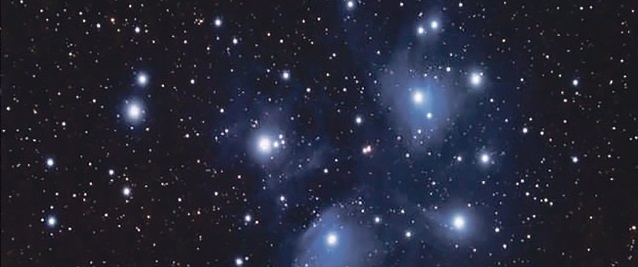
It’s 4.30am. I’m sitting on a blanket with my tuakana – my older brother – at the Ōtaki rivermouth.
The pre-dawn sky is a canvas of deep, inky black scattered with stars. A waning Korekore Rawea moon is its centrepiece, radiating soft, gentle light down upon us. The air is still, crisp, disturbed only by the regular thumping beat of the nearby tide.
“Me timata,” my tuakana instructs. “I’ll say a line, then you repeat it back to me.”

A month later, with the faint cluster of nine stars in our sights, he and I recite the karakia he taught me that morning.
We invoke the name of Tāne-mahuta, who adorned the chest of Ranginui with starlight.
We call on dawn to break, to cloak the frosted peaks of Tararua.
We acknowledge the birds singing at the edge of the forests, who herald the rising of the sun. We embrace the chill of wind on our skin.
This is how we find ourselves. How we connect to the world around us. How we define our place in it.
This is how we welcome Matariki.
For the first time, Matariki will be celebrated as a public holiday this year on Friday, June 24.
I’ve been excited for this to happen ever since I got to review the Cabinet paper proposing to make the holiday official, when I still worked in government. Not because I want another day off work, but because I’ve been trying to make the celebration of Matariki a new tradition (or a revived tradition, rather) for my whānau for the last couple of years.
Formalising Matariki as a public holiday will only help to normalise it and encourage the celebration of it.
Why does this matter?
For me, reviving the traditions of Matariki is both a way of reclaiming what has been lost and celebrating what makes us Māori.
Most of our public holidays are imported, and practically all of them are, in some way, reminders of our colonisation: Christmas and Easter belong to the religions used as assimilation tools; Anzac Day is an exercise in selective remembrance, failing to acknowledge the young Māori men who returned from a foreign war only to find that their lands had been acquired by the Crown and allocated by ballot to Pākehā soldiers; Queen’s Birthday is a celebration of the same Crown, which failed to keep its promises in Te Tiriti o Waitangi – which is, of course, the point of Waitangi Day.
Matariki, on the other hand, is fundamentally Māori.
Its basis is in the maramataka, the lunar calendar by which Māori track the passing of time and the changing of seasons. Traditionally, it marked the end of a harvest season in preparation for the cold winter months ahead.
It was a time of reflection and grieving for those who had passed in the previous year, but it was also a time of celebration, of enjoying the abundance of kai that had just been harvested, and of looking ahead to the future and the year to come.
Whether you’re Māori, Pākehā, or tauiwi, these things are worth celebrating.
The significance of doing so at Matariki is that it’s grounded here, in this land – not borrowed from overseas, not informed by foreign values and beliefs.
It connects us to this place, to the way we see the cosmos, and where we stand in it.
The karakia taught to me by my tuakana, followed by a huge cooked breakfast of kai associated with the relevant stars, is how I intend to celebrate Matariki this year.
What about you?
OTHER STORIES
LATEST POSTS
- Who was our first knight?
- The doctors and hospitals that shaped Ōtaki
- How out-of-work men cleared Hautere
- History milling around
- Medals tell a story spanning the world
- Carl Lutz – farmer who loved the land, and Fordsons
- Money for the expressway – for whom does the bell toll?
- Claimants lament loss of Rangiuru Pā
- Medal for Roy after nuclear test service
- Arthur saw nature ‘with eyes of admiration’
- Ōtaki-Māori Racing Club ‘focused on mana and mauri’
- If you’re not there you won’t know what’s going on
- From whaler cottages to Airbnbs
- Ōtaki abuzz with film festival - Ōtaki Today
- Hall helps to connect and build community
- Vault opens door to local history
- Fear breeding fear, fear and more fear
- Plenty of help organisations in times of need
- Oddities beneath the floorboards
- Tales of a winning cricket team
- Poor official communications fuel misinformation
- Cultural infrastructure could be our saviour
- Four-storey blocks coming as developments fast-tracked
- The world’s therapist offers little hope for global ills
- Modern conservatism the quiet killer
- Di’s QSM for services to community and environment
- However bad it might get, keep smiling
- AI is coming, ready or not
- Rewi’s story one of adversity in old Ōtaki
- Arise King Brown of the Kingdom of Auckland
- Rebuilding should draw on mātauranga
- Urban designer poses critical question - What’s the plan for Ōtaki?
- Brown hits the fan as water levels rise
- When small stuff becomes really big stuff
- New road evokes memories of apples and steam trains
- History in a humble tomato box
- Unfettered lies and misinformation threaten us all
- A slick and shiny surface signals a ready expressway – almost
- Black ferns 10, NZ Rugby 0 – no contest!
- Let’s think outside the box to solve town’s problems
- Misinformation, crime and political shenanigans
- A full life for proud dad Sam Doyle
- A vote for me is a vote for nothing
- Helping navigate the crossroads of people’s lives
- Enduring the tough life of homelessness
- A time to reflect on local politics
- Ōtaki could be even greater, if by design
- Uncovered swagger stick tells sad tale
- Sad day for Ōtaki
- It takes a village to raise a child

